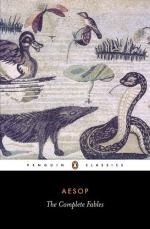A Slave ran away from his master, by whom he had been most cruelly treated, and, in order to avoid capture, betook himself into the desert. As he wandered about in search of food and shelter, he came to a cave, which he entered and found to be unoccupied. Really, however, it was a Lion’s den, and almost immediately, to the horror of the wretched fugitive, the Lion himself appeared. The man gave himself up for lost: but, to his utter astonishment, the Lion, instead of springing upon him and devouring him, came and fawned upon him, at the same time whining and lifting up his paw. Observing it to be much swollen and inflamed, he examined it and found a large thorn embedded in the ball of the foot. He accordingly removed it and dressed the wound as well as he could: and in course of time it healed up completely. The Lion’s gratitude was unbounded; he looked upon the man as his friend, and they shared the cave for some time together. A day came, however, when the Slave began to long for the society of his fellow-men, and he bade farewell to the Lion and returned to the town. Here he was presently recognised and carried off in chains to his former master, who resolved to make an example of him, and ordered that he should be thrown to the beasts at the next public spectacle in the theatre. On the fatal day the beasts were loosed into the arena, and among the rest a Lion of huge bulk and ferocious aspect; and then the wretched Slave was cast in among them. What was the amazement of the spectators, when the Lion after one glance bounded up to him and lay down at his feet with every expression of affection and delight! It was his old friend of the cave! The audience clamoured that the Slave’s life should be spared: and the governor of the town, marvelling at such gratitude and fidelity in a beast, decreed that both should receive their liberty.
THE FLEA AND THE MAN
A Flea bit a Man, and bit him again, and again, till he could stand it no longer, but made a thorough search for it, and at last succeeded in catching it. Holding it between his finger and thumb, he said—or rather shouted, so angry was he—“Who are you, pray, you wretched little creature, that you make so free with my person?” The Flea, terrified, whimpered in a weak little voice, “Oh, sir! pray let me go; don’t kill me! I am such a little thing that I can’t do you much harm.” But the Man laughed and said, “I am going to kill you now, at once: whatever is bad has got to be destroyed, no matter how slight the harm it does.”
Do not waste your pity on a scamp.
THE BEE AND JUPITER
A Queen Bee from Hymettus flew up to Olympus with some fresh honey from the hive as a present to Jupiter, who was so pleased with the gift that he promised to give her anything she liked to ask for. She said she would be very grateful if he would give stings to the bees, to kill people who robbed them of their honey. Jupiter was greatly displeased with this request, for he loved mankind: but he had given his word, so he said that stings they should have. The stings he gave them, however, were of such a kind that whenever a bee stings a man the sting is left in the wound and the bee dies.




